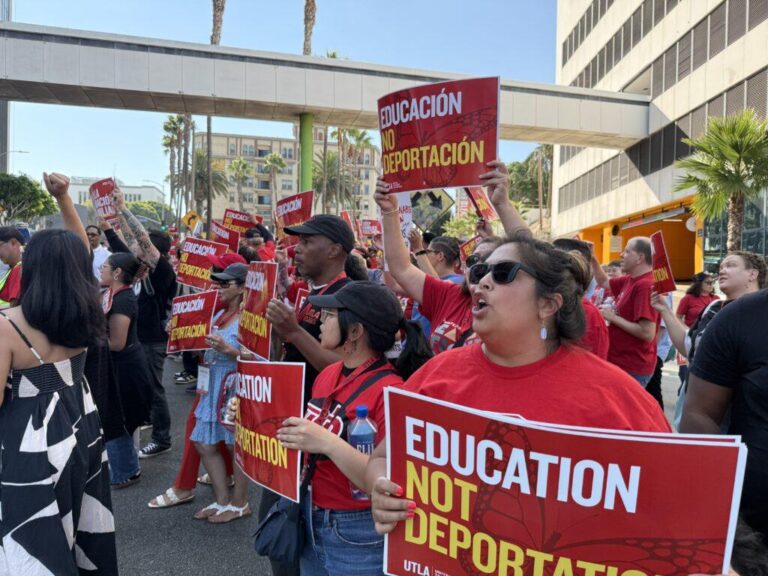Los Angeles Educators Oppose $20 Billion U.S. Arms Deal with Israel: A Growing Movement for Ethical Foreign Policy
Los Angeles Teachers Union Challenges U.S. Military Aid to Israel
The Los Angeles teachers union has emerged as a prominent critic of the proposed $20 billion U.S. arms sale to Israel, marking a significant intervention by a major labour organization in the national discourse on military exports and foreign relations.Union leaders argue that providing advanced weaponry risks intensifying conflict in the Middle East rather than promoting peace, urging federal lawmakers to reconsider the deal in favor of humanitarian aid and diplomatic engagement.
Key factors driving the unionŌĆÖs opposition include:
- Moral implications: Concerns over the use of American arms in conflicts that may harm innocent civilians.
- Resource allocation: Advocating for investment in education and local community programs rather of foreign military spending.
- Solidarity with global peace efforts: Supporting international movements aimed at sustainable conflict resolution and justice.
| Focus Area | Union Perspective |
|---|---|
| Regional Security | Potential to worsen instability |
| Humanitarian Impact | Risk of civilian harm |
| Fiscal Duty | Prefer domestic investment |
Human Rights Concerns Drive UnionŌĆÖs Opposition
Union officials have underscored human rights violations as a core reason for their resistance to the arms sale.Citing reports from international human rights organizations, they warn that supplying such a vast arsenal could exacerbate violence and infringe upon the rights of non-combatants.Their position reflects a broader commitment to social justice, emphasizing that U.S.foreign policy should prioritize humanitarian values over military expansionism.
Specific issues highlighted by the union include:
- Civilian harm: Documented cases where U.S.-supplied weapons have affected innocent populations.
- Insufficient oversight: Lack of clarity regarding the deployment of American arms overseas.
- Destabilization risks: The possibility that increased armaments could escalate regional conflicts.
| Concern | UnionŌĆÖs Stance |
|---|---|
| Human Rights | Prevent arms from enabling violations |
| Diplomatic Strategy | Favor negotiation over militarization |
| Protection of Civilians | Demand strict safeguards |
Influence on Political Dialog at Local and National Levels
The unionŌĆÖs outspoken opposition has injected new energy into political discussions both within Los Angeles and across the country. Known for its progressive activism,the cityŌĆÖs teachers union is part of a growing wave of labor groups engaging with international issues,especially those involving ethical and humanitarian concerns. This stance has sparked lively debates among policymakers, educators, and community advocates, expanding the traditional role of unions into the realm of global affairs.
Notable outcomes of this activism include:
- Grassroots mobilization: Union members and allied organizations have organized protests and educational events to raise awareness about the consequences of U.S. military aid.
- Pressure on elected officials: Local lawmakers face increased scrutiny regarding their positions on arms exports and Middle East policy.
- Shifting national conversations: The unionŌĆÖs position resonates with other labor and civil rights groups, encouraging broader coalitions to influence foreign policy decisions.
| Group | Response | Impact |
|---|---|---|
| L.A. Teachers Union | Campaigning against arms sale | Expanded political influence |
| City Officials | Mixed reactions, cautious engagement | Policy reviews under pressure |
| Community Organizations | Support and opposition grow | Heightened public discourse |
Growing Demands for Congressional Oversight and Reform
As opposition mounts from influential entities like the Los Angeles teachers union, calls for Congress to scrutinize U.S. arms sales policies have intensified.Lawmakers are urged to conduct thorough evaluations of the $20 billion weapons package to Israel, with critics emphasizing the need for greater transparency and alignment with American ethical standards and strategic goals. This push reflects a broader demand for accountability in foreign military financing.
Key reform proposals include:
- Improved transparency in arms agreements
- Stricter enforcement of human rights conditions
- Expanded congressional authority over military aid
- Regular assessments of armsŌĆÖ impact on conflict zones
| Stakeholder | Main Concern | Recommended Action |
|---|---|---|
| Teachers Union | Militarization and humanitarian impact | Oppose arms sale |
| Congressional Advocates | Insufficient oversight | Legislative review and reform |
| Human Rights Organizations | Escalation of conflict | Enforce compliance measures |
Conclusion: Unions Expanding Their Role in Global Policy Debates
The Los Angeles teachers unionŌĆÖs opposition to the $20 billion arms sale to Israel exemplifies a broader trend of local labor groups engaging with international policy issues.By taking a stand on U.S. military aid, educators are redefining the scope of union activism, linking domestic concerns with global ethical challenges. As this debate unfolds, it highlights the complex intersections between labor movements, foreign policy, and human rights in todayŌĆÖs political landscape.




